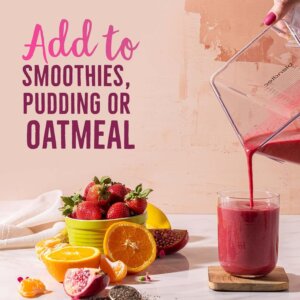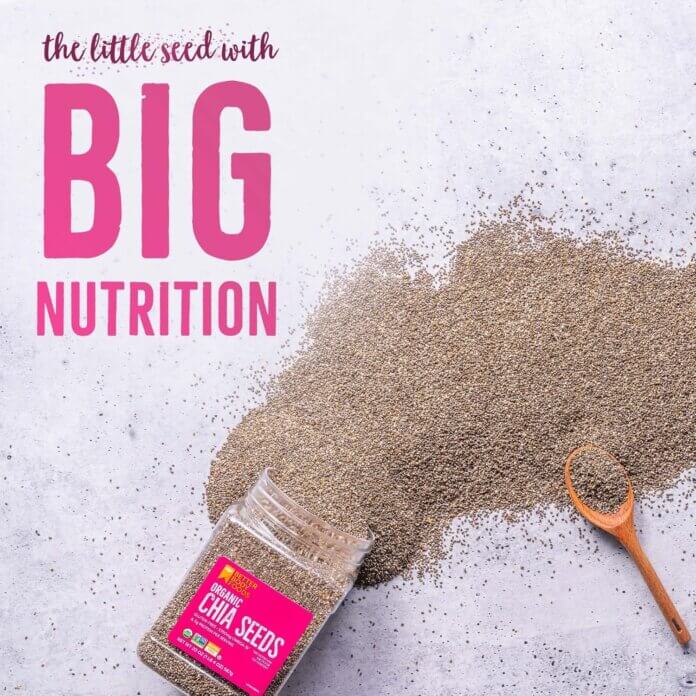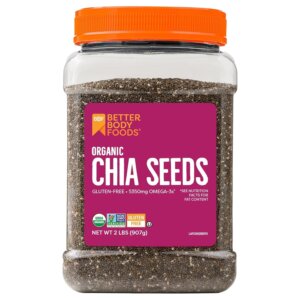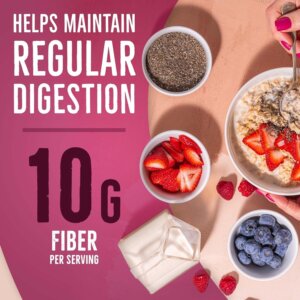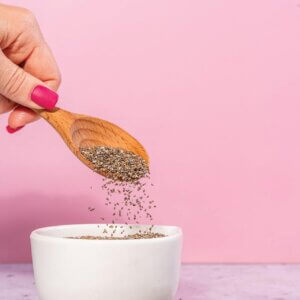What Are Chia Seeds?
Chia seeds are tiny black and white seeds packed with fibre, omega-3 fatty acids, protein, antioxidants, and essential minerals. These powerful nutrients may help lower cholesterol, blood sugar, and blood pressure while promoting overall well-being. The best part? You can consume them whole without grinding and still reap their benefits!
Health Benefits of Chia Seeds
1. Supports Blood Sugar Control
Several studies suggest that chia seeds can help regulate blood sugar levels. A clinical trial found that consuming 37 grams of chia seeds daily for 12 weeks led to:
- Lower haemoglobin A1c (average blood sugar over months)
- Reduced blood pressure
- Lower inflammation markers like C-reactive protein (CRP)
- Decreased clotting proteins, reducing heart disease risk
2. Aids in Lowering High Blood Pressure
In a study in which participants consumed 35 grams of chia seed powder daily for 12 weeks, researchers found a significant reduction in blood pressure—even among those on medication.
3. Improves Liver Health (MASLD)
Formerly known as nonalcoholic fatty liver disease (NAFLD), metabolic dysfunction-associated steatotic liver disease (MASLD) affects the liver due to excessive fat buildup. A study revealed that incorporating 25 grams of ground chia seeds daily for eight weeks improved liver health in more than half of the participants.
4. Helps Reduce Cholesterol
In the same MASLD study, participants who consumed 25 grams of chia seeds for eight weeks showed a significant reduction in total cholesterol levels.
Chia Seeds Nutritional Profile (Per 28g Serving)
| Nutrient | Amount |
|---|---|
| Calories | 138 |
| Fat | 8.7g |
| Carbohydrates | 11.9g |
| Fibre | 9.7g |
| Protein | 4.7g |
| Omega-3 Fatty Acids | 5g |
| Calcium | 18% of Daily Value |
| Magnesium | 30% of Daily Value |
Possible Side Effects of Chia Seeds
1. Digestive Issues
Due to their high fibre content, sudden increases in chia seed intake may lead to bloating, gas, and constipation. Introduce them gradually into your diet, and drink plenty of water.
2. Allergic Reactions
Some people may experience allergies, including breathing difficulties, skin rash, or itchiness. Seek medical attention if you have a severe reaction.
3. Impact on Blood Pressure & Blood Sugar
Chia seeds can lower blood pressure and blood sugar levels. If you’re on medications for diabetes or hypertension, consult your doctor before adding them to your diet.
Who Should Avoid Chia Seeds?
If you have the following conditions, talk to a healthcare provider before consuming chia seeds:
- Known chia seed allergy
- Bleeding disorders
- Low blood pressure or blood sugar
- Kidney problems
How to Use Chia Seeds in Your Diet
Chia seeds are versatile and easy to include in meals. You can sprinkle them on:
- Yoghurt
- Smoothies
- Salads
- Cereal
- Pancakes
- Puddings
Chia Water Recipe: Add 1-2 tablespoons of chia seeds to a glass of water, stir, and let sit for 10 minutes until the seeds form a gel-like texture. Drink and enjoy!
Best Collagen Protein Powder? Ancient Nutrition Collagen Review (Vanilla Flavor)
Recommended Daily Intake
Studies suggest that consuming 25-37 grams of chia seeds daily may provide health benefits. However, always consult your healthcare provider before making significant dietary changes.
Where to Buy & Store Chia Seeds
Chia seeds are available online, in supermarkets and health food stores. Store them in an airtight container away from sunlight to keep them fresh for up to four years. Bestseller chia seed by Amazon
Frequently Asked Questions (FAQs)
1. Can I eat chia seeds raw?
Yes, chia seeds can be eaten raw, but soaking them in water makes them easier to digest and enhances their nutritional benefits.
2. How long should I soak chia seeds before consuming them?
Soak chia seeds for at least 10-15 minutes for best results. If making chia pudding, let them soak for a few hours or overnight.
3. Are chia seeds safe for pregnant women?
Yes, chia seeds are generally safe during pregnancy, but it’s always best to consult your doctor before making dietary changes.
4. Can chia seeds help with weight loss?
Yes, chia seeds can promote weight loss due to their high fibre content. This fibre keeps you feeling full longer and reduces overall calorie intake.
5. Do chia seeds have an expiration date?
Chia seeds have a long shelf life and can last up to four years if stored in an airtight container in a cool, dark place.
6. Can chia seeds cause bloating?
Consuming too many chia seeds without enough water can cause bloating and digestive discomfort. Always stay hydrated when eating them.
7. How many chia seeds should I eat daily?
The recommended intake is between 25-37 grams per day, but start with a smaller amount and gradually increase it.
8. Do chia seeds need to be refrigerated?
No, but storing them in the refrigerator can help maintain their freshness for longer.
9. Can chia seeds help reduce cholesterol?
Studies suggest that chia seeds can lower LDL (harmful) cholesterol levels and improve heart health.
10. Are there any medications that interact with chia seeds?
Chia seeds may interact with blood-thinning, diabetes, and blood pressure medications. Consult your doctor if you’re on any of these medications.
Final Thoughts
Chia seeds are a superfood that provides numerous health benefits, from managing diabetes to improving heart health. Adding them to your diet can be an easy and delicious way to boost your overall well-being!
